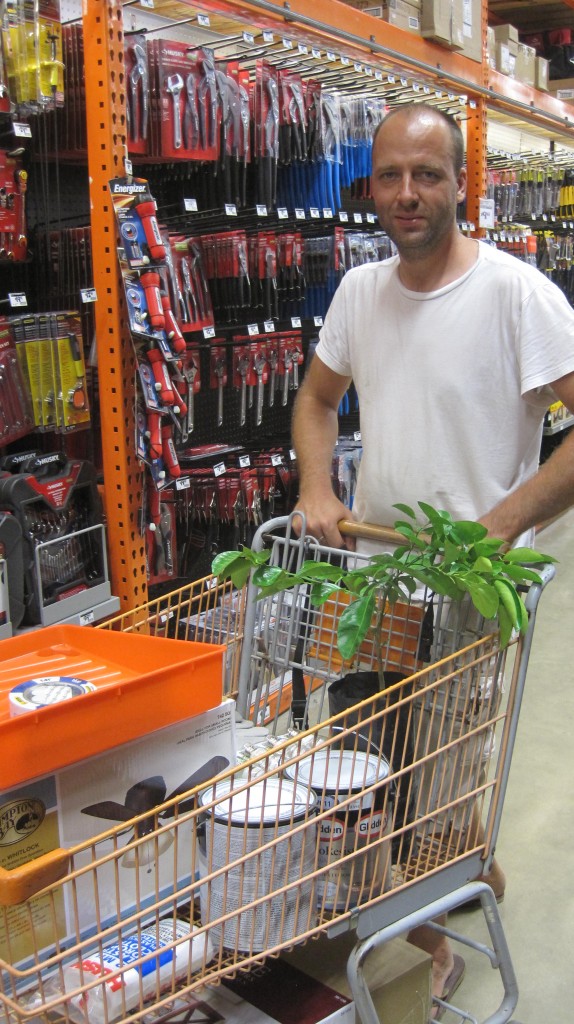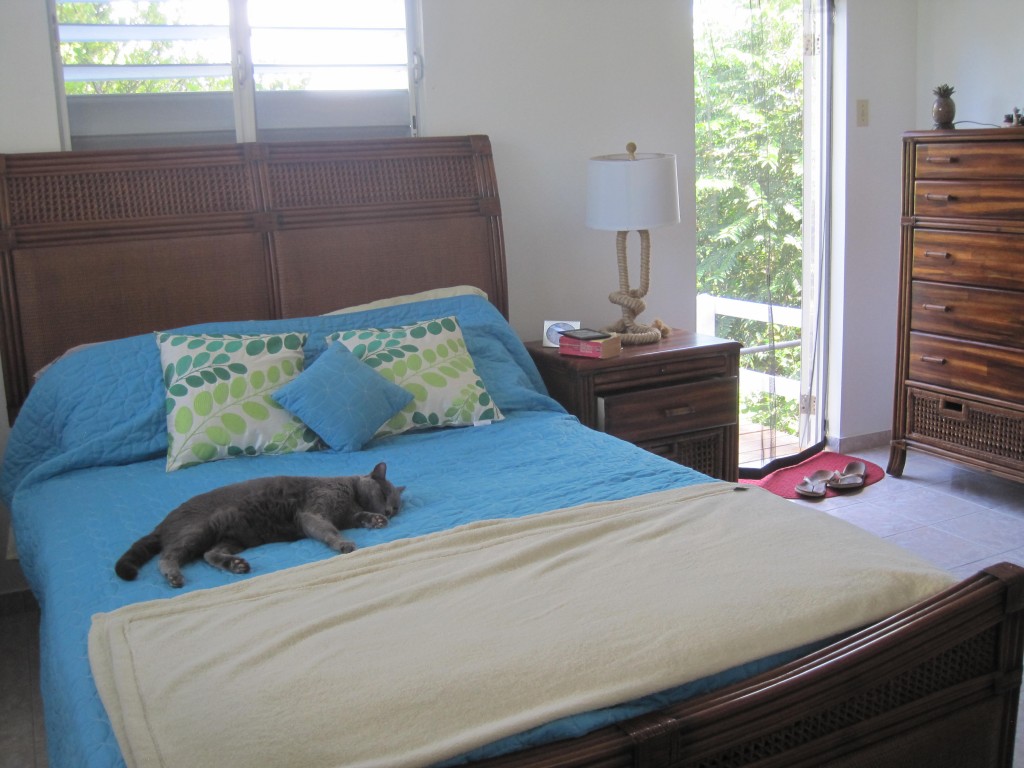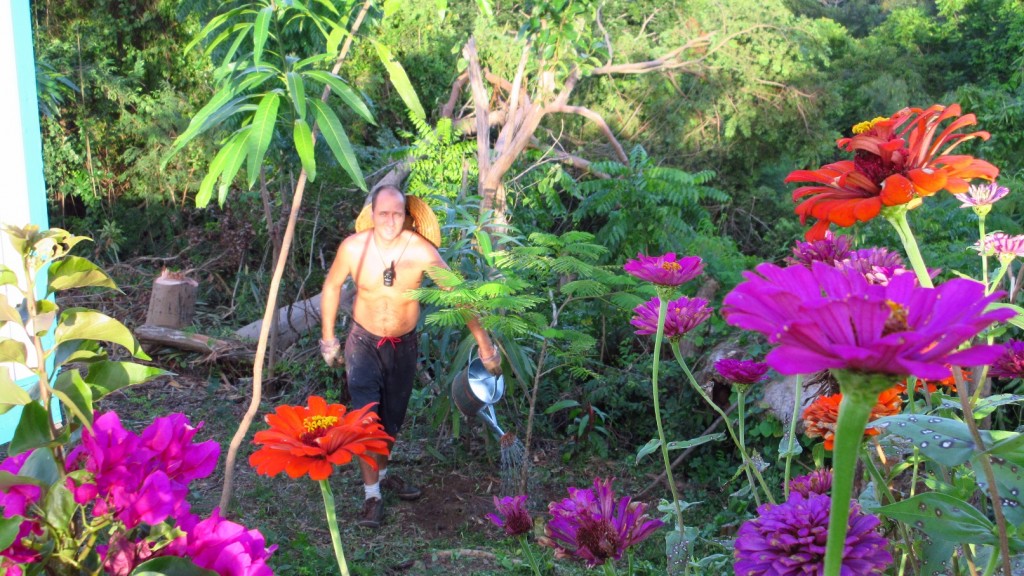Be careful of what you bring into your life.

One of many trips to Home Depot for “stuff”
This is yet another motto we try to remember especially as we have traversed this new life in Puerto Rico. Often times I think people just sort of slide into the lives they have and all of the belongings that they acquire. Everyone else has this or that, so I should too, we may say to ourselves. When we began sorting through all of our things in Greeley, it was incredible how much we had acquired over the 10 years we lived there. And we thought we were somewhat conscientious of our “stuff”.
Our “stuff” is a sort of parallel, a perspective that allows us to see what we value. You may think that a TV is just a TV but it also reflects your interests. TV shows, video games, movies, etc. Each object has an inherent use or meaning behind it. Sometimes those are obvious like the TV or a kitchen table, or a bed or washing machine, and sometimes those objects carry a sentimental or non-functional use, or a “future use” which is something that you think maybe down the line will be useful.
I have a hard time with that one because I am a future thinker. I love to imagine things down the line and I like to have a variety of resources available to me later. The problem with this is when it doesn’t actually come down the line. Then it is just junk cluttering up your space.
Living in a 300 sq foot studio cabana made us double think the importance of various objects. For example, a bed was crucial. It acts not only as a place to sleep but also as a couch for watching shows on the laptop. And since it is also in the middle of our living area, it is the main component of the room. Therefore we wanted it to look nice as well.

Our bed and central living space
The American mentality is often to just buy (or get) anything and everything. The more stuff, the better, right? Not so much when you consider the true cost behind each object. If it is something that you truly value (and by that I would say, something you use or think about at least weekly), then it is probably important enough in your life. But sometimes we bring things into our lives without truly considering the impact they will have.
Everything we have has an inherent trade involved. If you have a washing machine (like we do), you have the convenience of not having to wash laundry by hand, but you have traded space for this thing that will, at some point, break and either need to be replaced or fixed. Britton traded sawing down trees by hand for a chainsaw. But the inherent trade was higher levels of danger, ongoing maintenance, gasoline, blades and the potential to take down a lot more trees than desired. Even the bed that seems so obvious a choice had trades with it. We must clean the linens, and dust the frame and sweep under it. It takes up a lot of space (a lot more than hammocks would have for instance).
These trades are not just in large purchases like a washer or chainsaw or bed, but in all the small things as well. If you buy disposable water bottles, you are trading your money for something that brings convenience but contributes to the waste stream of harmful plastics and drives up the cost of something so basic and primal as water. If you buy or find a knick-knack, it will take up space in your life. You will need to dust it and keep it clean (or replace batteries depending on the object). And WHERE and HOW you buy your stuff also matters. Buying locally keeps the money in the local economy and more directly helps people than big corporations, but it may be more expensive. Buying online or in big box stores may be “cheaper” but far more expensive in many other regards.
If you haven’t seen the Story of Stuff, it is a must!
The point is that every item in our life has many reverberating consequences that we may not have thought about before bringing them into our life. Sometimes we may bring something in and then realize that it wasn’t necessary or was actually causing too many other issues associated that we didn’t think about beforehand. So we need to dispose of it. Well, that means work. You either need to sell the objects or find someone to take them off your hands. Suddenly this thing that meant so much to you (or cost so much in terms of money) is now not worth much at all when you no longer need it. Your “stuff” has turned into “crap” as the wonderful George Carlin so astutely noted. We found this was the case when we moved as well. All of a sudden things we had paid $100 for would only bring $10-20 on Craigslist or a garage sale. Our precious stuff wasn’t so precious after all.
George Carlin nails it!
If you buy too much stuff this way (buy high and sell low), you are spinning your wheels. What is worse than spinning your wheels though, is to PAY to have your stuff held for you -such as in a storage container or buying a big house. This is when you know that your stuff has taken WAY too much of your life energy and the trade is far too steep.

We took our time finding this flamboyán a home (thanks Fran and Steve)
We have spun our wheels a little bit with the trees we have planted here. They are so small when they come from the nursery, but have the future potential to grow super tall. When we arrived we were so excited about planting that we would plant something in the first area that had been cleared out. Now that we have cleared more, we realize that many of them are planted too closely together and need to be transplanted. I remember learning from one of my very favorite and prescient bosses that there is a difference between activity and achievement. Just because you are running around frantically doesn’t mean that anything is actually getting done. Spinning your wheels.
I was talking with Britton the other day about our year anniversary in Puerto Rico. I said, congratulations on not doing anything major on the wood house this year. He looked at me like I was crazy. Of course we should have done more on the house, of course we should have a nice larger space to live in, he must have been thinking. But NOT doing something in this situation was actually a larger achievement than doing it.
Why? Well, it meant that we were being thoughtful and careful about what we truly wanted. We were not spinning our wheels and regretting rash or quick decisions. We took our time cutting down trees. We didn’t get our chickens or turkeys until we had taken care of our basic needs because we knew they would add another chore or element to our lives that we would have to take into consideration. With this amount of time we have been able to meet more people and understand our options even more. We have been able to see if the budget we had anticipated would work out (it has). If we had jumped in too fast it would have been chaotic and a lot more wheel spinning.
We are still working on this motto. It is so tempting to just go out and buy something. Especially at the first hint that something could be “easier” if we did. If you rationally break it down and list out the pros and cons, though, you may find that some things just don’t make sense in your situation but would make a lot of sense if you had been dealt different cards.
For instance, we had the opportunity to get a 400 gallon water cistern from a friend who was generously selling it for about half what you would buy it in the store. We were initially very excited about this great deal. As we thought about it more, however, we weren’t sure where to put it or what to do with it. Especially when our housing infrastructure hasn’t been completed. Would we use it as a backup for city water? Well, that’s not really necessary since we have at least 400 gallons backed up in the pipes and have always had water whenever the water has gone out. Would we use it as a rainwater catchment system to water plants? Well, our water bills have been so low (about as low as you can get) that cost of the tank and the cleaning of the tank (clorine tabs, time) and the space it would take up didn’t make sense either. Would we like to be completely off grid on rainwater only? If so, we would need a lot more tanks than just one and we would also need a lot more space to store them as well as some sort of filtration system and water purification system if it was to be potable.
Basically, we did the calculations. And the calculations kept coming back that we just really didn’t need the tank! At least not at this point in time. Being careful or mindful of the “stuff” in your life is sort of like being mindful of your food. It is easy to get careless and sloppy and just eat or buy whatever some company is marketing to you, but to be mindful means to actually think it through the long term. Down the line, will this move me forward in the direction I want to go or will I be spinning my wheels (or even going backwards)?
Our stuff has a deep emotional and ancient survival component to it as well which sometimes makes it harder to let go, but remembering to be mindful about what you bring into your life in the first place will help to filter out a lot of the “junk” or “crap” (now or later). The less stuff you have to think about the freer you can be.
